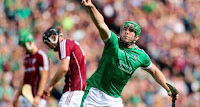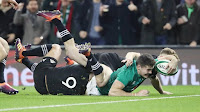 |
| If you want it, you'll have to fight for it. |
For all that, your correspondent can’t get it out of his head that Dublin won’t do it. The pressure and hype will be bananas, as more and more entities see the chance of a quick buck and climb up onto an already-overloaded Dub bandwagon. Even though the new rules are for the league only, who knows what tiny cracks the League will reveal that could be torn open in the white heat of Championship. But most of all, the biggest struggle that Dublin will face to win five-in-a-row is the struggle all dynasties face – the fact that players get old.
This runs against conventional wisdom. Conventional wisdom is that Dublin have found the alchemist’s stone, and can regenerate players like no-one else has been able to before. Brian Fenton and Con O’Callaghan are cited as proof, the replacements that are better than what went before.
And that’s all fine, but there are more constants over the four-in-a-row starting fifteen than you might think. Cluxton, obviously. But also Jonny Cooper, Philly McMahon, Cian O’Sullivan and James McCarthy. That’s a lot of backs, keeping a lot of pressure off Cluxton, who cares little for pressure. It will not be the shock of shocks if Dublin do win five-in-a-row, of course. But it won’t be as big a shock as some think if they don’t. After all, Kilkenny were meant to be able replenish their players at ease too, but when Jackie Tyrell and Tommy Walsh and Henry Shefflin went off into the sunset, things began to fall apart.
Of course, the monstrosity that is the Super Eight section of the Championship will do all in its power to preserve the powerful against the threat of the weak. Would anyone have heard of Mullinalaghta if there had been Super Eights in the Leinster Club Championship, or even in the Longford Club Championship?
The Super Eights is a further betrayal of all the Championship stands for and should stand for, a point made time and again in this place. In many ways, the highlight of the summer was the sight of empty seats in Croke Park for the Super Eights, something that so shocked the grubby moneymen who are behind the thing that changes have already been made. Hopefully, it’s too late and the thing will be sent back to whatever hell from whence it rose.
 |
| Shane Dowling. No better man. |
Heresy, I know. For those in Munster and Leinster – and even for people from Galway, I believe – these round-robin games seem to have been an unending series of delights. But for someone at a remove, it was a struggle to keep up and figure out exactly who is ahead and who is behind.
But that’s what a great competition should do! is the response. Of course. But only up to a point. There has to be a narrative or else it’s all very hard to sort in your head. If every game is an epic then no game can be an epic.
Someone remarked that Limerick’s win this year was actually the greatest win of all time as no other All-Ireland winner had to beat so many top-class teams to win the title. And that’s true, but it’s also true because no other teams had to – it used to be a knockout competition. Maybe, as time rolls on, we’ll get used to it. Maybe. But it’s very hard not to worry about hurling when people are spending a lot of money claiming to promote the game in Boston, Massachusetts, USA, when they don’t stir one princely finger to promote the game north of the M6 motorway. There is something here that doesn’t quite add up.
 |
| Jacobus Rex |
There are those who ask questions about friendlies and what will Ireland do in the World Cup. They don’t really want to know. Anyone who follows rugby knows the worth of what Ireland have achieved and anyone who doesn’t, probably doesn’t really want to in the first place, and is only looking for mischief.
But as with football and hurling, dark clouds loom in the distance. The game is changing all the time. Professionalism is twenty years old now, and rugby is so different from what went before. Amateur rugby was a backs’ game of field position. Professional rugby is a forwards’ game of ball retention.
The old order is under more and more strain because money wins every argument, and nothing that went before, as regards tradition or honour or how-we-do-things, can withstand money. Agustín Pichot, the former scrum-half for Argentina and now vice-chairman of World Rugby, has spoken of how the demands on players cannot be met in current circumstances, and he's right. Something's got to give, and some things already have.
France was a rugby powerhouse once. Now, her clubs have strangled the life out of the national team. It may be Stockholm Syndrome, as no team found more ways to annually batter Ireland than the French did, but now they’re gone it feels like the game has lost something, and there is an empty space where those gallant prancing cocks used to be. It just doesn’t feel right.
 |
The best man in Ireland, England,
Scotland and Wales?
|
It's a long path and it’s a lot to ask of Fury, who has his own demons to fight outside of the ring, but sport needs boxing. For a sport so easily corruptible, it is one of the noblest of sports in its way. I hope it can be saved in these changing times, and look forward to the rematch between Deontay Wilder and Fury with no little anticipation.


